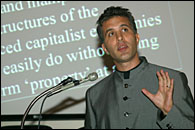Legal Sci-Fi
 Law professor Richard Gold
Law professor Richard GoldPHOTO: Owen Egan |
|
If the judicial system is to tame the over-growing thicket of intellectual property issues, it would do well to study some science fiction. At least, that's the informed opinion of law professor Richard Gold, the first Bell Chair in e-Governance at the McGill Faculty of Law.
To mark the creation of the Bell Chair, Gold spoke September 18 at the Maxwell Cohen Moot Court. His talk, "E-Governance: From X-World to e-World," was as much fantastic journey as legal lecture.
Rather than lose his audience to the technical difficulties of intellectual property law, Gold used Ursula Le Guin's prescient 1974 novel The Dispossessed as a kind of sci-fi parable to demonstrate the societal effects of extreme public versus private ownership. "As scholars, we should take a page from the best of science fiction (X-World)," he said. "We need to explore alternative worlds to learn more about our own (e-World)."
The opposing worlds of The Dispossessed are viewed through the eyes of a brilliant physicist named Shevek. On the protagonist's home planet of Anarres, property and resources are held in common and society is ruled by strict custom rather than law. On neighbouring Urras, private ownership and profit motive reign, resulting in a deep social rift between haves and have-nots. While Shevek finds himself intellectually smothered on Anarres by the overwhelming pressure to conform to custom, on Urras he becomes mired in power games and disturbed by the lack of community.
"One should not read Le Guin as saying that private property must inevitably destroy solidarity or that common property necessarily stifles creativity," Gold explained. "Nevertheless, she suggests—perhaps even insists—that we ought not to separate the way that we allocate goods and control over those goods from decisions about what kind of society we wish to build."
Gold charged that the judicial systems of our world have failed to meet Le Guin's challenge. Landmark decisions by the United States Supreme Court in the 1980 cases of Diamond v. Chakrabarty (extending patent protection to living organisms) and Diamond v. Diehr (patenting computer programs) opened the floodgates to the patenting of everything from human tissue to Internet business practices. As earthlings and their corporations have grown ever more dependent on intangible assets, Gold argued, no court has yet considered how the patenting of ideas affects who gets to benefit from them, at what time, in what way and at what cost. "According to the Court," he said, "property is about economic incentives, not about distributive justice."
In the long run, Gold believes the social and ethical questions that come bundled with intellectual property decisions are too vast, or too dangerous, to be solved by government, industry, or even lawyers and judges. "Only the academy can provide a forum in which to challenge the status quo and examine distributive justice," he said.
To accomplish this, Gold proposed that the McGill Faculty of Law create a centre in which academics from every discipline, along with government, judicial and industry leaders, can convene to debate and resolve the fundamental issues surrounding ownership in the hyper-evolving information age. "The questions we need to pose are not simply technical; they are ethical," he said. "E-governance means that we must investigate the way that the legal system as a whole—from its distributional base in property law to its human rights implications in international human rights law -- helps shape the social, ethical and economic implications of technology.
"As X-World provided Le Guin, e-World provides us with the power of moral choice: the power to avoid stagnation and loss of human solidarity, the power to choose a just distribution, and the power to make changes to achieve it."
The Bell Chair in e-Governance was created by a $500,000 gift by Bell Canada through its participation in Bell University Labs.

